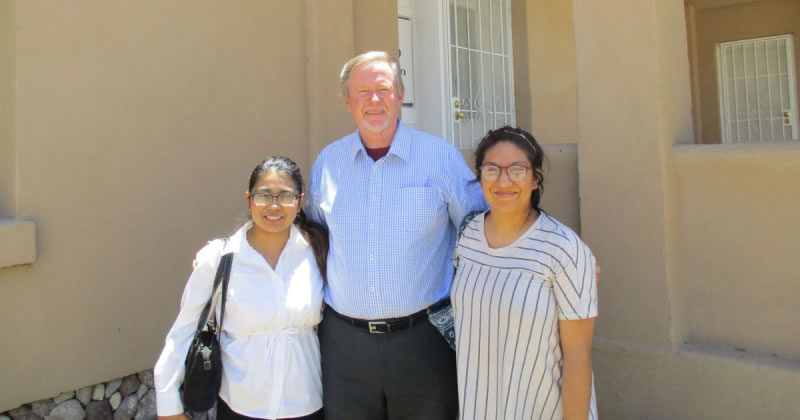
photo: Cynthia (left) at the Columban Mission Center with Fr. Bob Mosher (Director, center) and another intern
With so much heated rhetoric and misinformation out there, it’s hard to have a clear picture about what’s really happening in the US/Mexico border region. That’s why we think it’s crucial to listen to the people who know it best: border residents.
Cynthia Gonzalez is a native resident of the US-Mexico border region. She holds a double degree in Psychology and Political Science from the University of Texas at El Paso and is currently pursuing a Masters in Social Work. Cynthia has volunteered with different community organizations in El Paso, TX, including: Centro de Salud Familiar La Fe, Centro Agrario Sin Fronteras, and the Columban Mission Center.
At the Columban Mission Center, Cynthia supported different faith-based, immigration advocacy efforts. She has also participated in advocacy and leadership development projects with Hope Border Institute, an advocacy and research office in the Diocese of El Paso. In her free time, Cynthia enjoys spending time at her local parish, where she has served as a religious formation catechist, and volunteers at their immigrant and refugee shelter.
This interview was conducted over email, and has been edited for clarity and length.
Q: What changes have you seen on the US/Mexico border over the course of your lifetime?
The most significant changes started taking place soon after 9/11. Residents of this region began to see a drastic increase in law enforcement presence. This presence inevitably made my community change. For instance, it made it more difficult to commute between Ciudad Juárez and El Paso. The high-level of security and the long waiting lines started to deter people from coming and going between cities. For us, this had a huge impact because we are one community of two cities. Most of us have family on both sides of the border and commuting is just part of our daily life. Although our cultural ties remain strong, the physical barriers are a hindrance on our lifestyle.
Q: What are some challenges that border communities face? How do border enforcement policies play out in border communities?
Historically, our communities have been places of encounter. Border enforcement policies instead instill a sense of fear and distrust. Border enforcement policies also have a direct impact on businesses, deterring tourism and stifling the economic growth of the region.
Q: What are your thoughts on the rhetoric surrounding the border that is coming from the administration and Congress?
We are a welcoming community. Our people are generous and kind. The rhetoric about our communities is dangerous and untrue. My city, in particular, has been noted as one of the safest cities in the United States. I believe this is thanks in part to our large immigrant population and our diverse roots. We take care of each other. We support each other. Any rhetoric that portrays something different is a result of misinformation.
Q: From your perspective, what do border communities need?
Border communities need to be appreciated and respected. We need policies that reflect the reality of the border and that seriously consider the challenges that we experience here. I believe policymakers would really benefit from hearing our perspective when they try to write effective policy.
Q: Why is faith-based advocacy on the border important?
Our community is driven by faith and moral values. We understand the importance of helping those who suffer and are vulnerable - just like the Gospel asks us to. Faith-based advocacy organizations, in particular, have been a vital support to our region. The various religious organizations have been at the forefront, leading the way to protect the most vulnerable.
Q: What is your vision of a thriving border community?
A place where everyone is free to express their love and compassion for each other. A place in which we freely embrace our culture, and where others are able to come and appreciate it too.
Q: What do you want people who don’t live on the border to know about border communities?
I want them to know that we are strong, we are unique, and we are welcoming. Our community and everything we have will always be available to anyone that needs it.
Q: What can people do to stand in solidarity with border communities even if they don’t live on the border or can’t make a trip there?
To anyone not living on the border, I personally want to invite them to come and see it for themselves. I guarantee that they will be surprised by the kindness and hospitality that this community offers.
*Editor's Note: Download our Border Solidarity Toolkit for a curated list of resources and activities that will help you learn more about US/MX border communities and how you can support them through prayer, education, and action.
Copyright © 2025 Columban Center for Advocacy and Outreach, Washington, D.C.